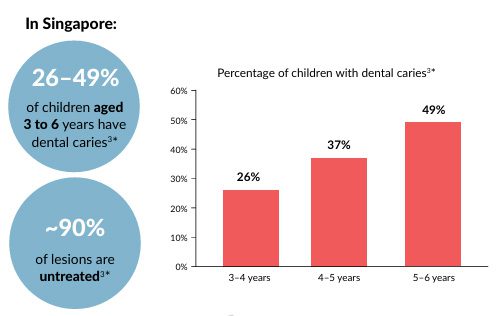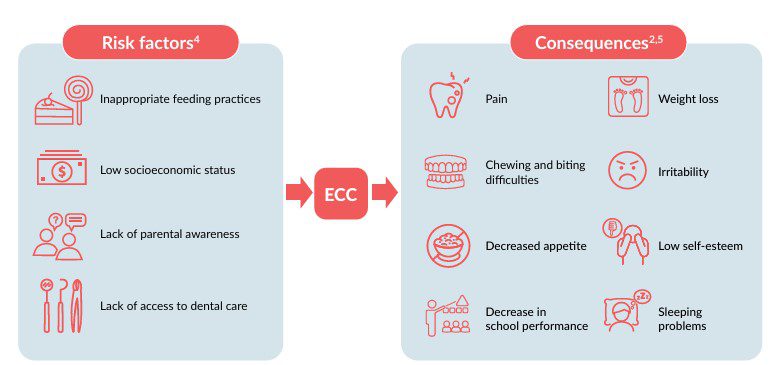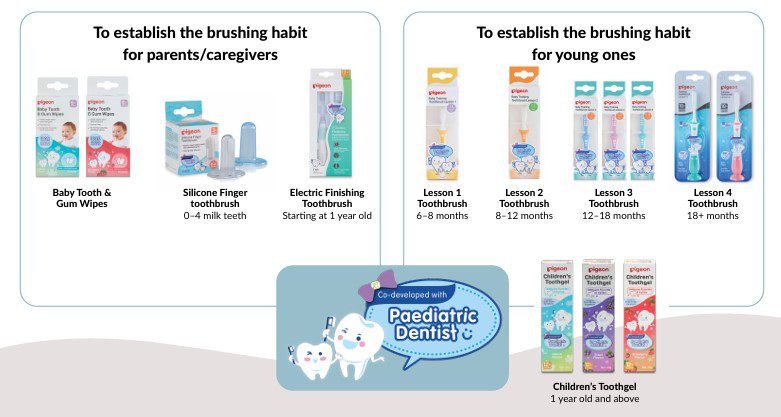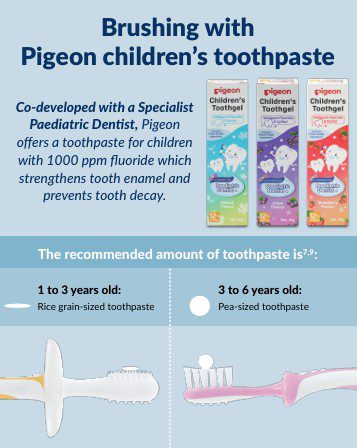Early Childhood Caries: Definition and Prevalence
ECC is the “presence of one or more decayed (noncavitated or cavitated lesions), missing (due to caries), or filled tooth surfaces in any primary tooth in a child under the age of six years old.” – The American Academy of Pediatric Dentistry1,2


* Based on a 2009 cross-sectional study conducted in Singapore involving 1,782 children aged 3–6 years.
ECC, early childhood caries
Early Childhood Caries: Risk Factors and Consequences


Risk factors4
- Inappropriate feeding practices
- Low socioeconomic status
- Lack of parental awareness
- Lack of access to dental care
Consequences2,5
- Pain
- Weight loss
- Chewing and biting difficulties
- Irritability
- Decreased appetite
- Low self-esteem
- Decrease in school performance
- Sleeping problems
Strategies for Establishing Early Oral Health Habits in Children
Infancy is a critical period for establishing good dental habits; early-stage dental care can help to prevent ECC.6
Start good habits early
From birth, the infant’s gums should ideally be wiped two times a day with a clean, damp, soft washcloth, gauze or gum wipes.7
This will also help infants become comfortable with the routine of cleaning their teeth.7
When to start brushing an infant’s teeth?
An infant’s teeth should be brushed with an age-appropriate soft toothbrush as soon as teeth appear, usually around 6 months of age.7,8
Parents and caregivers should assist or supervise tooth brushing until at least 7 years of age.9
Start Good Habits Early With Pigeon Oral Care Products
Pigeon oral care products have been co-developed with a Specialist Paediatric Dentist to support oral care and the development of good oral health habits throughout infancy and early childhood.


Benefits and Safety of Fluoride Toothpaste
Fluoride plays a key role in preventing dental caries.
For the prevention of ECC, twice-daily toothbrushing with fluoride toothpaste of a minimum concentration of 1000 ppm is recommended, from the eruption of the first tooth up to 6 years of age.9,10
Encourage the safe use of toothpaste:
- The European Commission (EC) suggests that toothpaste is not the main source of fluoride ingestion in a child less than 2 years of age.11
- The EC also suggests that a concentration of up to 0.15% or 1500 ppm fluoride does not pose a safety concern when used by a child less than 6 years of age.11
- To reduce the risk of fluorosis, parental supervision during brushing and the use of an age-appropriate amount of toothpaste is strongly advised.9


Recommendations for Parents: Key Practices for Promoting Paediatric Oral Health
Practicing other healthy dental habits from infancy, in addition to regular toothbrushing and the use of fluoride toothpaste, can promote good oral health and prevent dental caries.6
- Visit a dentist regularly, starting from 1 year of age onwards.7 Starting early helps the child get used to dental examinations for anticipatory guidance to prevent oral diseases.12
- Parents and caregivers should visit the dentist regularly to ensure that they do not have any caries that can be transmitted to their child.13
- Practitioners and caregivers are advised to lift the child’s upper lip when checking for the presence of caries.7
- Wipe infants’ gums two times a day before they have any teeth.7
- Minimize oral exposure to natural or refined sugars by avoiding sugary food and drinks for children under 2 years of age.6,13
- Do not dip pacifiers in liquids containing sugar.13
- Avoid letting the infant sleep with a feeding bottle filled with milk, formula or other sweetened liquids.13
- Introduce a cup around the child’s first birthday, because drinking milk from a cup rather than a feeding bottle can help avoid tooth decay.14
Summary
- Starting good dental habits in infancy is important to promote good oral health in childhood.
- The use of soft-bristled toothbrush and age-appropriate fluoride toothpaste with a minimum concentration of 1000ppm fluoride is recommended to prevent dental caries in early childhood.
- Pigeon offers a comprehensive range of oral care products co-developed with a Specialist Paediatric Dentist to support good oral health from infancy.
References
- American Academy of Pediatric Dentistry. Definition of Early Childhood Caries (ECC). Available at: https://www.aapd.org/assets/1/7/d_ecc.pdf. Revised 2008. Accessed 23 Mar 2024.
- American Academy of Pediatric Dentistry. Policy on early childhood caries (ECC): Consequences and preventive strategies.The Reference Manual of Pediatric Dentistry. Chicago, Ill.: American Academy of Pediatric Dentistry; 2023:88-91.
- Gao XL, et al. Community Dent Health. 2009;26(1):12-17.
- Anil S, Anand PS. Front Pediatr. 2017;5:157.
- Singh N, et al. J Oral Biol Craniofac Res. 2020;10(2):83-86.
- American Academy of Pediatric Dentistry. Perinatal and infant oral health care. The Reference Manual of Pediatric Dentistry. Chicago, Ill.: American Academy of Pediatric Dentistry; 2023:312-6.
- HealthHub. Baby Teeth, Teething and Oral Health. Available at: https://www.healthhub.sg/live-healthy/baby-smile-a-little-smile. Accessed 23 Mar 2024.
- American Dental Association. Eruption Charts. Available at: https://www.mouthhealthy.org/en/all-topics-a-z/eruption-charts. Accessed 22 Apr 2024.
- Toumba KJ, et al. Eur Arch Paediatr Dent. 2019;20(6):507-516.
- World Health Organization. Ending childhood dental caries: WHO implementation manual. Available at: https://www.who.int/publications/i/item/9789240000056. Accessed 20 Mar 2024.
- European Commission. Scientific Committee on Consumer Products Opinion on the Safety of Fluorine Compounds in Oral Hygience Products for Children Under the Age of 6 Years. Accessed 23 Mar 2024.
- HealthHub. Paediatric Dentistry: Child’s First Encounter. Available at: https://www.healthhub.sg/a-z/medical-and-care-facilities/paediatric-dentistry-child-first-visit-dentist. Accessed 23 Mar 2024.
- American Academy of Pediatrics. Bright Futures: Guidelines for Health Supervision of Infants, Children, and Adolescents. Available at: https://downloads.aap.org/AAP/PDF/Bright%20Futures/BF4_OralHealth.pdf. Accessed 20 Mar 2024.
- American Academy of Pediatrics. 10 ways to promote oral health in infants. Available at: https://www.aap.org/en/news-room/news-releases/health–safety-tips/american-academy-of-pediatrics-10-ways-to-promote-oral-health-in-infants/. Accessed 23 Mar 2024.

 Book an Appointment
Book an Appointment


